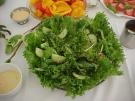 In the third study, researchers suggest that cabbage and sauerkraut may protect women from breast cancer. Data collected from the U.S. component of the Polish Women's Health Study showed an association between eating cabbage and sauerkraut and a lower risk of breast cancer.
In the third study, researchers suggest that cabbage and sauerkraut may protect women from breast cancer. Data collected from the U.S. component of the Polish Women's Health Study showed an association between eating cabbage and sauerkraut and a lower risk of breast cancer.The effect seemed to be highest among women who eat high amounts starting in adolescence and continue to do so throughout adulthood. The most protective effect appeared to come from raw or briefly cooked cabbage, the researchers said. "
The observed pattern of risk reduction indicates that the breakdown products of glucosinolates in cabbage may affect both the initiation phase of carcinogenesis -- by decreasing the amount of DNA damage and cell mutation -- and the promotion phase -- by blocking the processes that inhibit programmed cell death and stimulate unregulated cell growth," said lead researcher Dorothy Rybaczyk-Pathak, a professor of epidemiology at the University of New Mexico, in a prepared statement.
In the fourth study, researchers from Brigham and Woman's Hospital in Boston found that ginkgo biloba appears to lower the risk of developing ovarian cancer. "
There are herbal supplements used in the treatment of cancer, although there is not much scientific evidence to support their use," says lead researcher Bin Ye. "Our study looked at ginkgo use in women with and without cancer.
We found, in a population-based study, that 4.2 percent of cancer-free women reported taking ginkgo biloba regularly. However, only 1.6 percent of women with ovarian cancer reported taking ginkgo regularly."
(The HealthDay Web site) 2005 HealthDay News

No comments:
Post a Comment